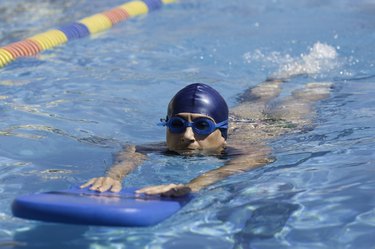
Whether you are a new swimmer or the training partner of Olympian Michael Phelps, using a kickboard can enhance your workout. Along with swim fins, goggles and pull-buoys, swimmers can use kickboards as part of a complete cardiovascular workout. Athletes of all ages reap benefits by using kickboards to isolate leg movements, remain streamlined and take a breather during a lengthy workout.
Balance and Buoyancy
Video of the Day
Kickboards give confidence to fledgling swimmers, both young and old. Swim instructors often use kickboards as a flotation device to provide buoyancy for their students and to isolate desired movements, such as the dolphin kick in butterfly or the flutter kick in freestyle. Because swimmers keep their heads above water with a kickboard, instructors can communicate easily with students while swimming alongside. For reluctant swimmers, kickboards boost confidence by keeping the swimmer afloat while they exercise by doing laps or treading water.
Video of the Day
Focused Workout
Using kickboards allows swimmers to focus exclusively on a workout for the legs, hips and stomach muscles. As swimmers grip the kickboard in front of them, they take their arms out of the workout equation and place a heavier burden on the legs. Athletes who cross-train to keep in shape for running and triathlon events often choose kickboards as a part of their leg-strengthening workouts. By isolating particular muscles, swimmers are able to exercise efficiently with notable results.
Rest for Arms
Swim-team coaches can use drills with kickboards to give swimmers a brief respite from otherwise intense arm workouts and to emphasize the importance of using the legs. Some swimmers get in the habit of relying primarily on their arms when swimming, dragging their legs behind haphazardly. The most efficient swimmers keep up a steady kick that helps propel them through the water. From a social standpoint, using a kickboard allows competitive swimmers to chat with lane mates and literally take a breather.